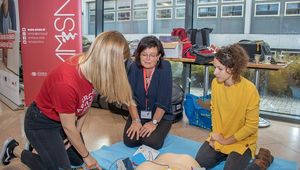A new international study involving the Department of Neurology at the Kepler University Hospital in Linz yields important information regarding the ideal time to begin blood-thinning treatment once a patient has suffered a stroke and atrial fibrillation.

The ELAN study’s findings (Early vs Late Initiation of Direct Oral Anticoagulants in Post-Ischemic Stroke Patients with Atrial Fibrillation) have been recently published in the renowned journal "New England Journal of Medicine".
Artery blockage in the brain is responsible for approximately 80% of all strokes. Of these, up to 20% involve a blood clot that can form in the heart of those who experience cardiac arrhythmias (such as atrial fibrillation). In an effort to prevent these blood clots from forming (and any subsequent strokes), patients suffering atrial fibrillation are being treated with blood-thinning drugs called direct oral anticoagulants (DOACs). Univ. Prof. Dr. Raimund Helbok, head of Neurology at the JKU’s Faculty of Medicine and head of the Department for Neurology in Linz, explains: "To date, there have been no representative study data to determine just the right time to start oral anticoagulation following an ischemic stroke in order to reduce the risk of a recurrent stroke, but at the same time, minimizing a possible bleeding risk under blood-thinning therapy." The Department of Neurology in Linz has 161 beds, making it one of Europe’s largest neurological departments.
Deciding when to begin treatment during the first few days following a stroke is challenging on account of a higher risk of cerebral hemorrhage. On the other hand, however, the potential benefit to prevent another stroke may be highest during these first days. Depending on the severity of the stroke, international treatment guidelines have previously recommended waiting a few days to two weeks to begin DOAC treatment.
The ELAN Study: International Collaboration
Led by Prof. Urs Fischer at the University Hospital of Bern, the current ELAN study (Early vs Late Initiation of Direct Oral Anticoagulants in Post-Ischemic Stroke Patients with Atrial FibrillatioN) is investigating this issue specifically. OA Dr. Milan Vosko, head of the Stroke Unit at the Kepler University Hospital’s Department of Neurology, established the collaboration and remarked: "This kind of complex, clinical challenge can only be addressed by a multicenter, randomized study as part of of an international collaboration."
The study involved a total of 2,013 people suffering from acute ischemic stroke and atrial fibrillation between 2017 and 2022 from 103 stroke units in Europe, the Middle East, and Asia. Early initiation of anticoagulation therapy was defined as "within 48 hours of a minor/moderate stroke, or on day 6-7 following a major stroke." Late onset was defined as "day 3-4 following a minor stroke, day 6-7 following a moderate-severe stroke, or day 12-14 following a severe stroke."
ELAN Study Findings Impact Treatment for Stroke Patients Suffering Atrial Fibrillation
The study suggests that starting anticoagulation earlier rather than later is safe and could reduce the risk of recurrent stroke without increasing the risk of complications (cerebral hemorrhage). Patients who received early anticoagulation therapy were less likely to have recurrent stroke, symptomatic cerebral hemorrhage, extracranial hemorrhage, systemic embolism, or vascular death within 30 days. This reinforces the supporting evidence that early treatment initiation with a DOAK may be useful with no increased risk of cerebral hemorrhage.
The study’s findings were published in the internationally renowned journal "The New England Journal of Medicine" on May 25, 2023. Senior physician Caterina Kulyk (head of the Stroke Unit and the neuroultrasound laboratory at the Linz MED Campus) is the lead study author for Kepler University Hospital.









![[Translate to Englisch:] Dr. Martin Kaltenbrunner [Translate to Englisch:]](/fileadmin/_processed_/7/c/csm_Kaltenbrunner_Martin_Credit_JKU_df59d0cda8.jpg)

